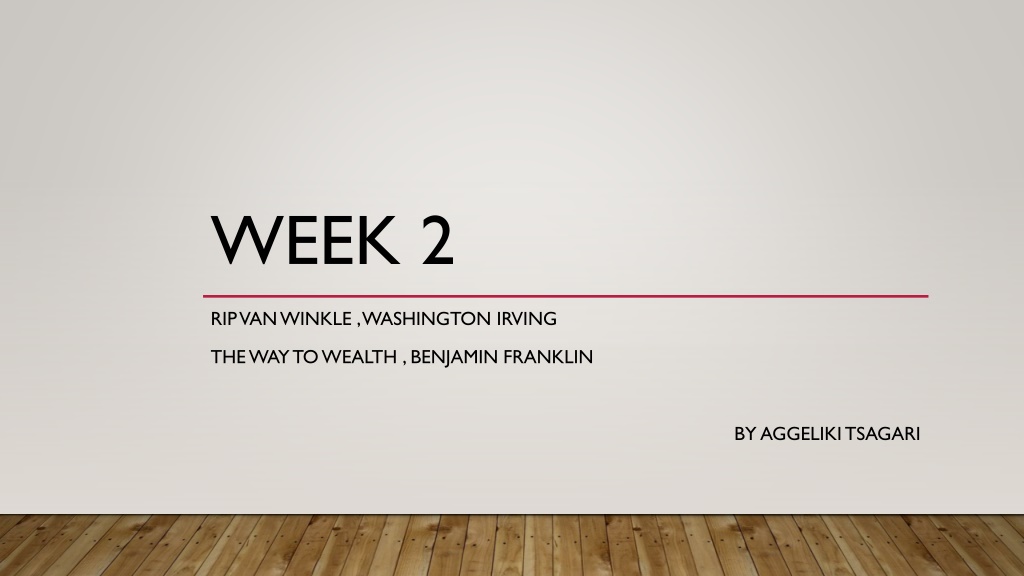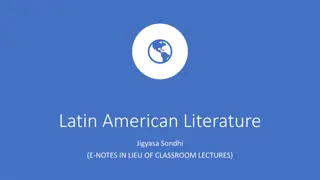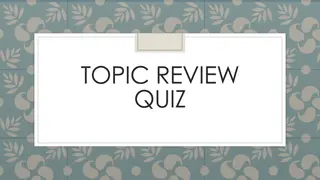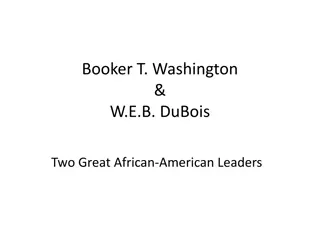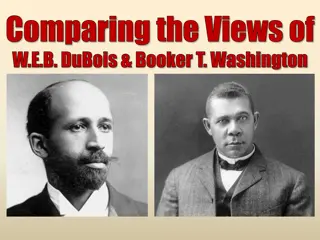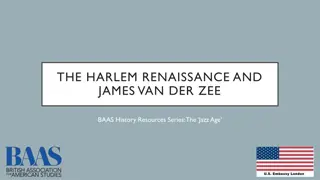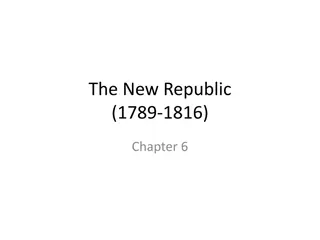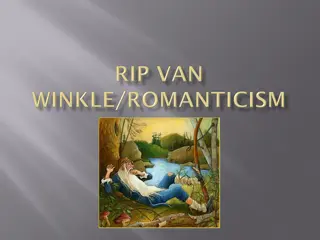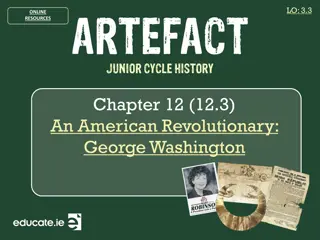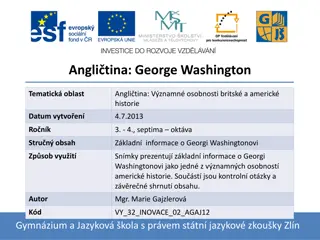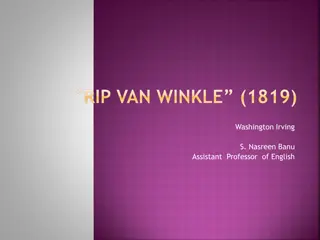Exploring American Literature: Rip Van Winkle & Washington Irving
Discover the timeless tale of Rip Van Winkle by Washington Irving, a classic American story embodying themes of freedom, constancy, and the colonial tradition. Unveil Irving's influential works, which blend horror, humor, and historical elements, making a lasting impact on literature worldwide.
Download Presentation

Please find below an Image/Link to download the presentation.
The content on the website is provided AS IS for your information and personal use only. It may not be sold, licensed, or shared on other websites without obtaining consent from the author. Download presentation by click this link. If you encounter any issues during the download, it is possible that the publisher has removed the file from their server.
E N D
Presentation Transcript
WEEK 2 RIP VAN WINKLE ,WASHINGTON IRVING THE WAY TO WEALTH , BENJAMIN FRANKLIN BY AGGELIKITSAGARI
AMERICAN LITERATURE PERIODIZATION PRE-COLUMBIAN PERIOD The Colonial Period (1500-1830) The Post-Revolutionary Period of Romanticism and Transcendentalism leading almost up to the end of the 19th century. Realism and Naturalism (1870-1910) The Modernist period spanning roughly from the pre-WWI (turn of the century) years through to the interwar period and leading up to WWII The Post-war / contemporary period.
RIP VAN WINKLE WASHINGTON IRVING The sketch book of Geoffrey Crayon(1819) Recovered text
WASHINGTON IRVING (1783-1859) Influential Horror and Humor Wrote biographies (Columbus &Muhammad) Romantic influence, American elements (folklore, history, local color) World-wide influence Rip Van Winkle was influenced by a Faux Dutch historian: Diedrich Knickerbocker
RIP VAN WINKLE Escapist Fantasy Framed tale Rip sleeps through the defining moment of American history Rural utopia / Nature Rip as an anti-Franklean hero
THEMES FREEDOM VS TYRRANY=freedom to be his kind simple self and live the idle life he wants. His wife is the form of tyranny constraining his freedom as she nags him constantly and ferociously to work on the farm. Neither domestic nor civic responsibility intrude on Rip s lifelong freedom. CONSTANCY AND CHANGE=Rip is the embodiment of constancy - regardless of the vast changes that occur he remains the same. The village represents drastic change .
COLONIAL TRADITION=Rip is the embodiment of early colonial and its simple way of life before an increasingly intense focus on work for money and profit became a hallmark of the U.S.A VOLUNTEERISM VS WORK FOR PROFIT=Rip loves to work but only when he volunteers his labor to others. He does not willingly work for his own or his family profit or benefit; though he really helps his neighbors he refuses to farm his own land HISTORY AND FICTION=It is the theme that opens and closes the narrative with the elaborate promise of Irving s made up narrator Diedrich Knickerbocker that the story represents historical facts. Irving wrote both fiction and well researched history. In Rip Van Winkle he explores the divide between fact and fiction and the location of truth in both. He also examines the value of fiction as a compliment to historical fact
SYMBOLS 1. The Catskill (Catskill) Mountains: they represent mysterious magical or supernatural forces of change that affect human life they are described as having magical hues and shapes and as fairy mountains. They provide refuge to Rip when we wants to escape his wife and family responsibilities The supernatural quality of the mountains is reinforced by the ghostly visitation of Hendrick Hudson s crew. Rip reborn by Nature. 2. Inn&Union Hotel : represents the idleness and rejection of profitable work that is the core of Rip s life. The other men also sit there and gossip. The inn stand for laziness and unproductive lives. The hotel represents the values of Commerce, political engagement and money making, in direct contract to the inn it replaced.
CHARACTERS The Stranger RIP VAN WINLKE Kind and gentle Generous(eager and willing to help his neighbors) Hates to work Liked by his fellow villagers Isn t sufferable to his nagging wife (does not support his family by farming) Seeks calmness in the mountains or the Inn Dame Van Winkle(The wife) Mother of Rip s son and daughter A terrible nag - Antagonist Harsh, loud, intolerant woman who speaks her mind Dressed in old-fashion clothes Seems to be a member of Explorer Hendrik Hudson s crew Maybe a ghost Judith Gardenier His grown daughter Peter Vanderdonk Descendant of a historian who wrote about the towns history, confirming the story about Hudson
THE WAY TO WEALTH BENJAMIN FRANKLIN
BENJAMIN FRANKLIN(1706-1790) He was a statesman, author, publisher, scientist, inventor and diplomat, printer. Native Americans call him The 1StAmerican Born in Boston During the American Revolution, he served in the Second Continental Congress and helped draft the Declaration of Independence in 1776 Had only 2 years of formal education First attempt to write: at the age of 12 He adopted a character of a middle aged woman as 14 year old to write about themes such as love, using a satirical tone. His brother published his writings without having knowledge of the writer. He became an abolitionist in Pennsylvania
The 2 most important texts by Franklin 1. Franklins autobiography: Established what we call The American dream . Benjamin Franklin writes about himself but to describe the opportunities he found, how he took advantage of them and to express that every man can make his dreams come true. 2. Poor Richard s Almanack: First almanac-first demographic survey. Benjamin creates Richard Saunders, a persona which he kept for 25 years. He sold more than 10.000 copies. Richard became B.F or B.F became Richard. A compilation of calendars, weather forecasts, poems, sayings and aphorisms, mathematical exercises, astrology, news stories et.al. A reflection of norms and social mores of the times. Using other people s ideas and aphorisms: what s important is not who the author is but how the idea is put into use. Firstly BF had slaves, but then changed his mind and fought slavery.
THE WAY TO WEALTH 12-page preface for the final 1758 edition, originally titled Father Abraham s Speech In this preface Father Abraham cites only those proverbs that concern hard work, thrift, and financial prudence. The Franklinian Work Ethic 1. Industry Preface = ironic critique on authorship / parts removed in 1770s rewriting to emphasize on the maxims about industry. 2. Frugality 3. Productivity This text exemplifies Franklin s work ethic(except for industry).There s direct reporting of an incident.
THE WAY TO WEALTH CHARACTERS i. Father Abraham Read many books and was interested in Poor Richard s works Has been quoting him for almost 25 years The almanac is like a life guide to him i. Poor Richard The author of an almanac Wise Shares his wisdom ,which he gained from going through hard times Could be taken as a character ,although it s a book Priceless information teaches about using time, the value of money, and the cost of achievements praises labor and exposes laziness i. Almanac
THEMES WISDOM AND FOLLY: the people represent a state of folly and they are in a state of gaining wisdom SAVING MONEY AND HARD WORK: there are 2-equal- ways of gaining wealth, making money and saving money. They are of equal value because even if one is working all the time but never saves money he will never be rich. COMPLAINING: there is no room for complaining if one is taking responsibility for their progress in life. There will be sleeping enough in the grave Poor Richard
SYMBOL THE WAY TO WEALTH: it is a path from one form of life to another FORMAL ELEMENTS: SETTINGColonial America TONE: Advisory and humorous, also use of irony MOTIF RECOMMENDATIONS that concern every aspect of a man s life which are focused on self-development and self-improvement IRONY We are taxed twice for our idleness : we should fight laziness Lost time is never found again": time is valuable and we should take advantage of it Troubles springs from idleness ALLEGORY THE STORY is like a didactic guide for people who need encouragement. A book that contains answers to all the questions. It it like a bible
